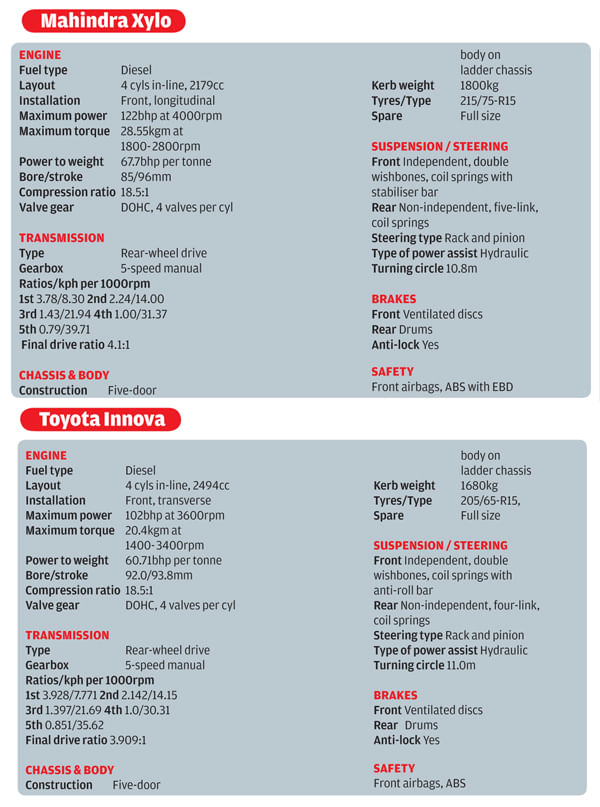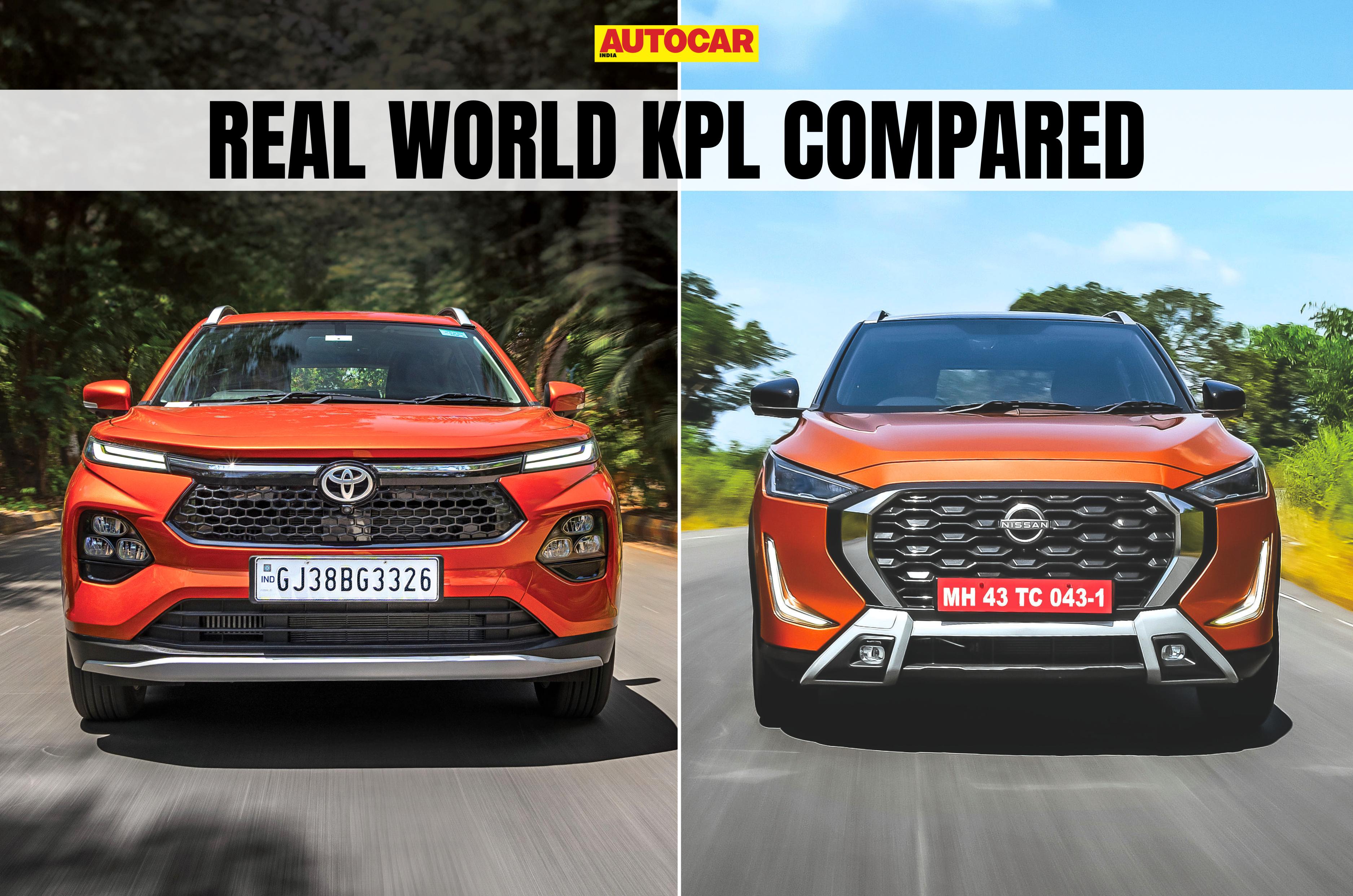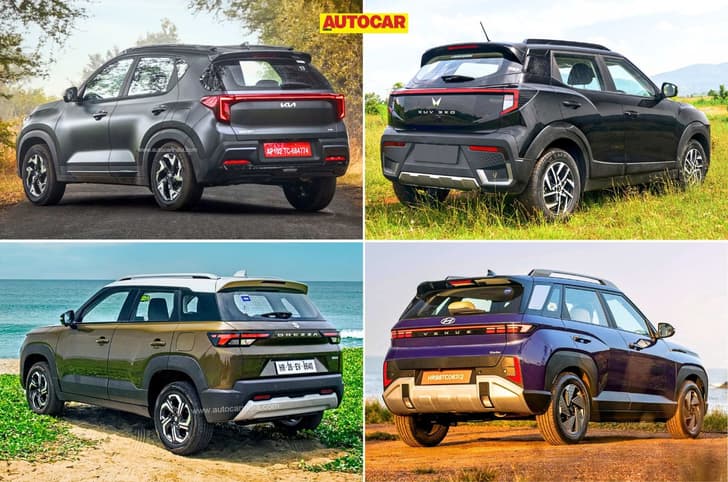As people-movers go, the Toyota Innova has long been a favourite with large families and tour operators alike. And it’s really not hard to see why. It’s comfortable even with a full complement of passengers, it is economical to run and being a Toyota, breakdowns are almost unheard of. Then there are its car-like driving dynamics which makes it appeal to self-drive buyers as well. In many ways, the Innova felt head and shoulders above the rest of its comparatively primitive competition which also justified its premium pricing. That was until Mahindra’s Xylo came in to spoil Toyota’s party.
While the Xylo wasn’t particularly attractive to look at, it did catch the fascination of a whole host of buyers. With acres of space being its prime USP and Mahindra’s impressive mEagle diesel engine under the hood, all at an affordable price, the Xylo did dent the Innova’s appeal to a fair extent. In fact, the Xylo ran the Innova close on many counts but somehow couldn’t better its Japanese competitor.
Mahindra has not thrown in the towel just yet with the introduction of the facelifted and, in many ways, better Xylo. Is the newer Xylo good enough to take on and beat the Innova that itself received a nip and tuck recently? Time to play judge.
Design and engineering
Mahindra drew a lot of flak for the Xylo’s ungainly styling with that sloping bonnet and large, upright cabin bay making the MPV look quite awkward in profile. The good news is that subtle tweaks to the design make it look less gawky than before. Leading the list of changes is the new, squarish profile to the bonnet that now drops down to a less ‘in your face’ seven-slat grille. The headlights are mildly restyled too and get nice black-and-chrome detailing. Lower down, the black skirting on the bumper edges is new too.
Blackened B, C and D pillars, matt finish footboards, and chrome on the rub strips and new roof-rails are other indicators to this being the facelifted model. Clear lens tail-lights and a new rear spoiler complete the makeover. While the changes do make the Xylo more palatable than before, the big Mahindra still won’t win any design awards.
In comparison, the more traditional MPV lines of the Innova look quite pleasing. Toyota has updated styling only recently though the changes are not all that comprehensive, which is a shame given the Innova is nearly seven years into its lifecycle. In its facelifted avatar, the MPV gets a slightly wider and more upright grille which is complemented by restyled headlights that now stretch further back towards the fenders. The bonnet gets new ridges and there is also a revised bumper with a larger air dam and neat shrouds for the pod-like fog lights. Frontal styling apart, you’ll have to be really observant to tell this is the updated model. The rearview mirror-mounted indicators, new side skirts, reprofiled tail-lamps and wider chrome bar on the tailgate are the only other giveaways of the redesign. What remains a constant is the Innova’s good build quality that makes it feel far better put together than the Xylo.
Under the skin, the MPVs are quite similar with both relying on body-on-frame construction. The Xylo’s independent front suspension uses double wishbones and coil springs while rear suspension duties are handled by a five-link, non-independent, live axle with coil springs. The Innova uses similar suspension hardware as the Xylo with coil springs on all four wheels, independent wishbones up front and a four-link rear setup. Front disc brakes, rear drums and ABS are the norm here, with the Xylo additionally featuring EBD.
Interiors
Mahindra has made a few changes to make the Xylo cabin more appealing. Coffee-brown plastics and seats on the top E9 variant we tested add a touch of class here. Then there are the smaller details. The door handles, for instance, feel a lot more robust and the rounded gear knob is much nicer to hold. However, the dashboard is a carryover from the earlier Xylo with a smaller Digital Drive Assist System (DDAS) readout above the central AC vents being the only modification. As before, DDAS can be programmed to display useful data like speed, temperature, humidity, current fuel economy and also a picture of your favourite deity!
In E9 avatar, the Xylo gets steering-mounted controls for the audio player as also Bluetooth telephony and cruise control system that are new inclusions. Mahindra has also equipped the Xylo with voice activation to operate functions like the wipers, headlamps, door locks and radio. The system follows Indian accents better than what we’ve seen elsewhere but somehow it feels too gimmicky. Two mobile phone- charging points for middle row passengers is a thoughtful addition, though. Fit and finish is noticeably improved but still doesn’t match up to the Innova.
As with the exteriors, changes inside the Innova cabin are quite limited. The centre console has been redesigned to accommodate the new touchscreen interface for the audio, DVD and Bluetooth phone functions. There is also a reverse camera now which works well and removes the guesswork when parking the MPV into tight spots. Top-end Innovas also get climate control, a feature not available on the Xylo. All plastics now come finished in a lighter hue of beige while the faux wood trimmings look quite convincing. The Innova also gets reworked Optitron instruments which remain easy to read. As on the Xylo, the Innova too features a dual air-con, dual airbags and keyless entry.
The Xylo’s high floor means you have to trek your way into the cabin, but once inside you can’t help but take notice of the abundance of space here. Contributing to the airy feel are the large windows that also give passengers a great view out. The leather seats are new and come with good bolstering. Moreover, the front passengers get adjustable armrests and you can also adjust lumbar support here. Middle row passengers also have it good with comfortable captain chairs (eight-seat versions come with a bench-type seat). You can also join the front two seats to form a flat bed, which is actually quite comfortable. Access to the third row is decent and the seats are actually comfy enough for long distances. But headroom is in short supply, so anyone over five feet eight inches is best advised to sit in the middle row.
With the seats at just the right height, you can literally walk into the Innova. The fabric front seats are flat but still quite supportive. Surprisingly, there is no dead pedal here and the seatbelts can’t be adjusted for height either. Like the Xylo, the Innova can be had with either a pair of captain chairs or a bench for the middle row. The Innova’s width and flat contours of the bench make it possible to sit three abreast in good comfort. Rear-most passengers will be forced to sit in a knee-up position but space isn’t all that bad either, so long as the middle row has been pushed forward to its front-most position.
But a crucial advantage the Innova has over the Xylo is with luggage space. Even with all three rows in place, you can still stow a few soft bags. The Innova is also more generous in terms of storage space for smaller items.
Engine, gearbox and performance
This Xylo E9 comes with the 2.2-litre, 122bhp mHawk engine from the Scorpio. Lower versions still come with the 2.5-litre, 112bhp mEagle. Still, despite the lower swept volume, the mHawk makes about 4kgm more than the mEagle thanks partly to the higher compression ratio. This engine comes mated to a new gearbox, the 5MT320 which uses detent pin technology and has synchromesh even for reverse to smoothen gearshifts. The layshaft bearings have also been changed for better efficiency.
The Xylo feels peppy from the word go. There’s more than adequate grunt and its low and mid-range responses are particularly strong. Strong enough to clearly distance it from the Innova. 0-100kph comes up in 12.9sec, almost five seconds ahead of the Innova.
In fact, the Innova’s engine is a bit of a chink in its armour. The 2.5-litre D-4D motor was recently upgraded with an intercooler to help it meet BS IV norms but it still makes just 102bhp and 20.4kgm of torque and is easily outclassed by the mHawk. Still, there’s enough grunt, the Innova pulls cleanly from 1000rpm and it is extremely driveable. What it isn’t so good at is highway speeds. The Innova feels best at 80kph, post which the engine gets quite noisy and there’s not much grunt either. Compounding matters is the noticeably short fifth gear that keeps the engine spinning at a rather frenzy (for a diesel) 2800rpm even at 100kph. The mHawk, in contrast, is spinning at a more relaxed 2500rpm.
The Xylo motor is also more refined and smoother than the Innova’s engine and this makes it all the better. The Innova does have a key advantage though and that is with its weight. At 1680kg, it weighs a full 120kg less than the Xylo, so though it doesn’t feel particularly quick, its responsiveness means you really don’t feel the power disadvantage when you’re ambling about town. The Innova’s lighter clutch and slicker gearbox also mean you don’t need too much effort to drive it in town.
Ride and handling
The ability to transport upto eight occupants in comfort is also a function of the ride quality. An uncomfortable ride can really take the fun out of long-distance journeys, which the two MPVs here will be undoubtedly used for.
The original Xylo was notorious for being too softy sprung with excessive vertical movement at speed and also a lot of roll through corners. Mahindra has used the mid-life revision to beef up the Xylo’s front anti-roll bar and also alter damper rates all around in the interests of bettering body control. Sadly, the modifications have improved the Xylo’s dynamics only marginally. The suspension still feels too soft at highway speeds with the MPV exhibiting a constant bobbing motion on anything less than perfect tarmac. As an effect, high speed stability isn’t as good as it could and should be, forcing you to always drive the Xylo a notch down. And that’s a shame for the Xylo’s mHawk engine is actually well suited to high-speed cruising.
The soft setup and high centre of gravity also play spoilsport when you have to take a series of bends. There is far too much rocking from side to side, giving the impression you are captaining a boat. The Xylo also feels quite nervous under hard braking as the rear has a tendency to step out.
In terms of driving dynamics, the Innova is in a whole different league. Its lower stance and slightly stiffer suspension make it feel a lot more composed on the highway. The ride remains flat and consistent on most occasions and that inspires a lot of confidence at high speed. What’s nice is that the Innova doesn’t feel out of its comfort zone even on curvy roads. Not to say that the Innova will be able to keep up with your average midsize saloon on a hill section but handling is predictable and very car-like. And that is a trait few MPVs can boast of.
Within city limits and at slower speeds, it is the Xylo that has the slight edge when speaking ride comfort. While the Innova is quite good on jagged surfaces, the Xylo does a better job of cushioning occupants from what lies beneath. However, drivers will prefer the Innova for its light and fairly direct steering that makes it feel more manageable in urban confines. The Xylo steering calls for a bit more effort though there is decent feedback on offer here. We did find the Xylo steering lacks sufficient self-centering motion, so you’ll need to keep a firm hand on the steering at all times.
Fuel economy
The Xylo weighs a whole 120kg more than the Innova but fuel economy is almost at par within the city and actually better on the highway. The reason? The Xylo’s ample torque means you always use less throttle compared to the Innova. For the record, the Xylo returned 10.1kpl in the city to the Innova’s 10.3kpl. Out on the highway, the taller geared Xylo delivered 14.4kpl while the Innova was good for 13.8kpl.
Verdict
The facelift has undoubtedly made the Xylo easier on the eye, though its trump card remains space. The mHawk engine from the Scorpio is genuinely impressive too and suited to typical usage both within town and on the highway. Mahindra has also packed in a whole lot of features that make the Xylo a very tempting deal indeed. If price was the sole deciding factor, the Xylo would have been the easy winner here. However, the unsorted dynamics seriously mark the Xylo down, while build quality is still some way off matching the Innova’s. The Xylo simply lacks the Innova’s engineering finesse.
The Innova is far better to drive, more comfortable and is the more complete all-rounder. Yes, it costs nearly Rs 3 lakh more than the comparable Xylo but if you look at the big picture, the Toyota will also stand the test of time better than the Mahindra. And it is for these factors that the Innova still remains our choice of MPV to buy.




































%20copy.jpg?w=728&q=75)














